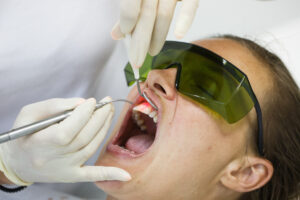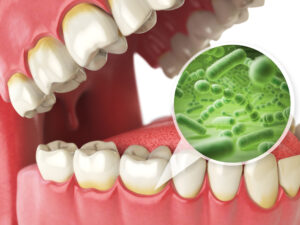How Can Dental Lasers Improve my Oral Surgery Experience?
Lasers have gained popularity in almost every area of healthcare, and dentistry is no exception. Lasers have a variety of applications, and dentists can use them in a variety of ways. As with any of our advanced dental technologies, Dr. Ann implemented the use of dental lasers in order to improve the efficiency of procedures, safety for the patient, and comfort of the patient.
Lasers provide specific benefits to patients undergoing oral surgery procedures, which we will cover in detail here.
What is a Dental Laser?
 Lasers, in general, are instruments used to penetrate into and through various tissues of the body. They can cut, cauterize, whiten teeth, kill bacteria and heal tissues. Like we said, they are pretty diverse!
Lasers, in general, are instruments used to penetrate into and through various tissues of the body. They can cut, cauterize, whiten teeth, kill bacteria and heal tissues. Like we said, they are pretty diverse!
Laser stands for Light Amplification by Stimulated Emission of Radiation. The concentrated energy of a laser beam is powerful and adjustable to make it suitable for a wide range of purposes.
There are many different types of dental lasers, some of which are effective at soft tissue treatments, and others which can cut both hard and soft tissues. Some dental lasers focus on the gums and oral mucosa, while others can remove enamel, dentin (the layer of tooth structure underneath enamel) and bone.
A dental laser may look quite similar to the traditional dental “drill” or handpiece. Rather than spinning and using a rotary bur, though, these handpieces hold laser tips, which focus the laser energy into an area smaller than one millimeter. Lasers are not silent; they usually create a buzzing or beeping sound.
What are the Alternatives to Laser Use?
Before the widespread use of lasers, dentists and oral surgeons traditionally used scalpels, hand tools, and drills to accomplish their necessary tasks. Lasers cannot substitute for these other traditional dental instruments in every situation, but they certainly give your dentist an alternative option.
For example, if your dentist needed to remove a tooth that had gum tissue partially covering it, she could quickly excise the excess gum tissue with a laser instead of having to cut into it with a scalpel.
What Oral Surgery Procedures might Include Laser Use?
A laser can be useful in almost every oral surgery procedure because of its many advantages in promoting healing and fighting inflammation. Some dentists and surgeons use a low level laser therapy as the last step in every surgery to do just this!
Here are just a few of the oral surgery procedures during which dentist might use a dental laser:
- Tooth extractions
- Placement of dental implants
- Uncovering of dental implants
- Biopsies
- Removal of excessive gum tissues

- Frenectomies
- Repair of peri-implantitis (gum disease around dental implants)
- Access to impacted teeth for orthodontic movement
- Reshaping jawbone and gum tissues as part of gum disease treatment
What are the Advantages to Laser Use in Oral Surgery?
Dental lasers provide multiple advantages to both the patient and surgeon when we use them for oral surgery procedures. These benefits arise from the laser’s effect on the target tissues, the surrounding tissues, and any bacteria present at the surgical site.
Less Invasive
A dental laser is able to target a much smaller area than a scalpel, hand instrument or drill. This not only allows for greater precision during use. It also makes the surgical site smaller and the overall surgery less invasive.
The tiny tips of a dental laser can reach deep, narrow pockets of gum tissue that would otherwise require opening the gums with a “flap”.
Kills Bacteria
 The laser energy projected from our dental lasers can sterilize a surgical site by killing bacteria. Obviously, having a sterile site improves the outcome of any surgery. In every area of dentistry, we only use dental instruments that are sterile so we never add any bacteria to the procedural site. With dental lasers, we remove all bacteria present.
The laser energy projected from our dental lasers can sterilize a surgical site by killing bacteria. Obviously, having a sterile site improves the outcome of any surgery. In every area of dentistry, we only use dental instruments that are sterile so we never add any bacteria to the procedural site. With dental lasers, we remove all bacteria present.
This reduces the risk of post-operative infections greatly!
Fights Inflammation
One important effect of laser energy on the tissues surrounding the site of its use is anti-inflammatory. Inflammation is an important aspect of the body’s natural defense against injury and infection. Acute inflammation causes pain and swelling, and it alerts us that something is wrong.
After a surgical procedure, inflammation is a natural, but unnecessary response. We know something is “wrong”, and we have already “fixed” it through the surgery. We don’t need the inflammation, and it only causes increased discomfort while you’re trying to recover and heal.
Lasers inhibit the inflammatory process in the tissues surrounding the surgical site. That means you should experience less swelling and pain as you heal.
Stops Bleeding
Dental lasers help to seal tiny blood vessels at the oral surgery site. This can lead to a much shorter time of bleeding after the procedure. Many people recognize the experience of leaving the dental office while biting on gauze pads to help staunch bleeding from an extracted tooth. Some people have a risk for prolonged bleeding due to medical conditions or prescription medications. Lasers allow us to mitigate those circumstances and keep our patients as comfortable as possible.
Promotes Healing
We all want to heal quickly. The laser’s effect on inflammation in the surrounding tissues and its elimination of all bacteria speeds up the healing process. The body is able to naturally heal much more rapidly when it isn’t fighting inflammation and infection. It can focus on generating new cells and tissue to close up the site.
It also promotes healing by creating a smaller surgical site to begin with. That means there is less tissue in need of healing.
Less Likely to Require Stitches
Lasers can take the place of much of the “cutting” of oral surgery. In traditional oral surgery, stitches may be necessary to close opened gum tissues, holding them together while they heal. Because we open less with lasers and have smaller surgical sites, there is a much lower chance that the site will need stitches.
More Questions about Lasers in Oral Surgery?
Call Designer Smiles today to schedule a consultation with Dr. Ann. She can answer all of your dental laser questions and explain how a laser might improve your oral surgery experience. With Dr. Ann’s expertise in both oral surgery and dental lasers, she will ensure that the procedure provides you with the most successful outcome possible.
